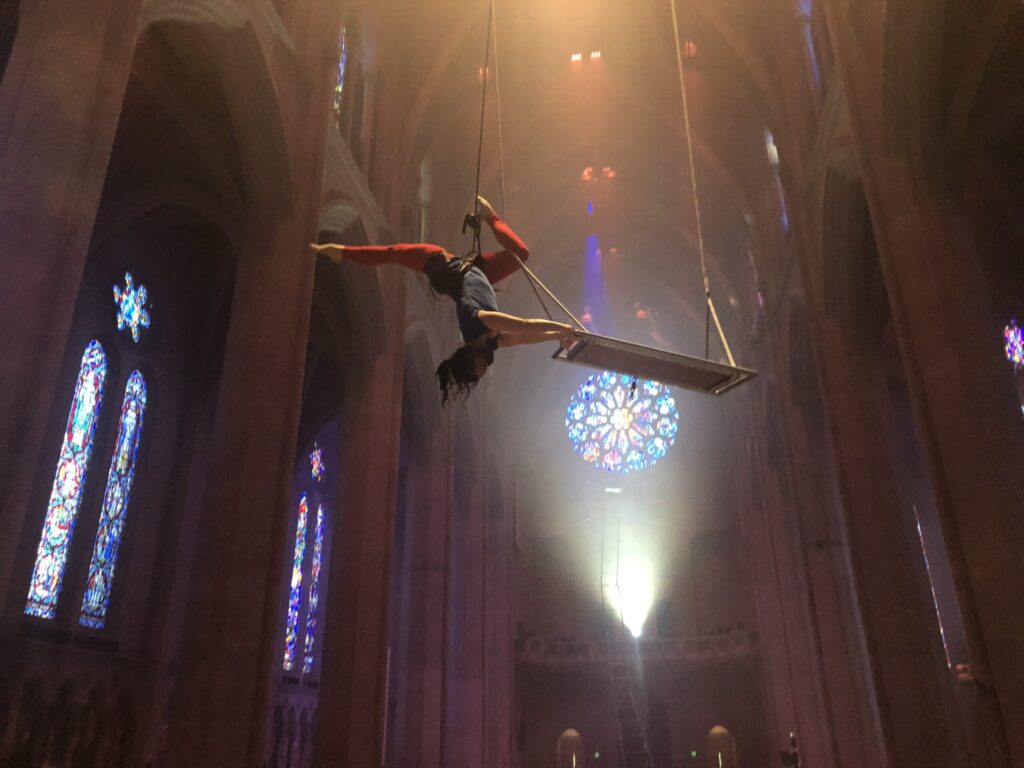
“This has been such a hard time,” says Joanna Haigood, artistic director of Bayview-based. Zaccho Dance Theater, reflecting back on the three years since she first began work on Love, a state of grace. The site-specific performance installation originally planned for the summer of 2020 that will be at last be presented at Grace Cathedral in four performances this weekend and next week.
Amidst the church’s gothic chambers, under ceilings that to 90 feet high, performers will soar, leap, climb and hang in suspension, sometimes painted with color as light pours through stained glass windows. Their movements, choreographed by Haigood, will be accompanied by MacArthur Fellow Walter Kitundu’s original score which integrates pre-recorded sound with a vocal ensemble, live acoustic instruments and the cathedral’s pipe organ.
Spectators will be free to wander through three distinct performance areas and to take part in meditative activities created specifically for the installation by theologians Yohana Junker and Cláudio Carvalhaes.
“I want people to come away with such a sense of connectedness,” explained Haigood in a recent interview with the Bay Area Reporter.
The piece has its origins in 2019, when Haigood began conceptualizing in response to a wave of violent acts at places of worship around the world, from the Muslim mosques in Christchurch, New Zealand to the Emanuel AME Church in Charleston, SC to the Tree of Life Synagogue in Pittsburgh, PA.
“The tenets of most faith practices are anchored in love,” she wondered. “So how is that set aside to justify violence against others? How do communities reconcile themselves in the wake of that?”
This was, Haigood acknowledges in retrospect, “Not a joyous way to think about making work in a place that aspires to something higher.”
It is those higher aspirations—among which Haigood includes “To love each other and our planet, to create security and a to offer one another a generous reciprocity”—that gradually transfigured her vision for the piece in the wake of George Floyd’s murder and over the course of multiple postponements due to the Covid-19 pandemic.
“We are so damaged, on a planetary level,” she says, “We need to come back to love. I know it sounds corny, but it isn’t. This time has brought up such a profound sadness. I feel like so many of us have a sense of isolation and disconnection. This piece has become part of my own healing, a need to be in communion with others.”
According Ciarra D’Onofrio, one of the aerialists, “This is not really a show where the audience is separated from the performers by a stage. We’re all going to be sharing this space, participating in a ritual together.”
“The audience can walk around within the work,” echoes Haigood. “You can experience it from many different perspectives.”

The piece consists of three interlocking sections, performed in a repeating 30-minute cycle. Each is an abstract, kinetic interpretation of a different aspect of love and faith. In “The Surrender” a giant swing flies the length of the nave and into the cathedral’s sanctuary, illustrating what Haigood describes as “the rush of letting go; “The Striving,” which aims to convey the earnest, painstaking work of devotion features a performer climbing a spectacular twisting ladder specially constructed for the show by designer Wayne Campbell finds a performer; and in “The Quieting” strength begets stillness in a hypnotic floating routine.
The work is presented and ticketed in three hour performance blocks. Audience members welcome to enter and exit the cathedral at any point during their selected block. Haigood says she expects most audience members will opt to spend a little over an hour, which will allow them to perceive the action’s rhythms and repetitions.
“Memory starts to play an important part for the audience as the movement repeats,” says Haigood. “There are reference points to take note of, and the work becomes a lot richer and more complex as the audience collects more information.”
“There are so many layers to it,” concurs D’Onofrio, who in addition to performing served as Haigood’s research assistant in the work’s earlier stages. “So much thought has gone into the piece. I hope audiences feel a sense of connection with it, and that the experience feels collaborative and communal.”
